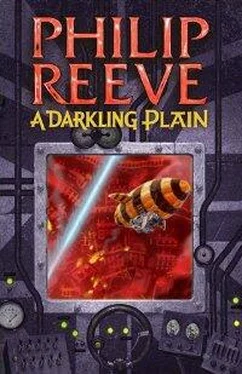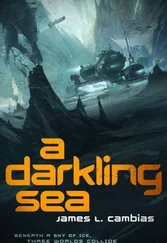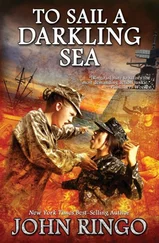Tom shook his head. “No, no. Clytie would never work for the Guild of Engineers—”
“The Clytie you knew might not. But she may have changed her mind, in twenty years.” Wolf stood up and walked to the windows, which he flung open, letting in the sounds of the party on the lawn. “Come,” he said, beckoning them out with him onto the balcony. Below, the bright gowns and uniforms of his parents’ guests speckled the garden like petals; like butterflies. For a moment, as he gazed down at them all, the young man’s face wore a look that could almost have been hatred.
“The truce will not last long,” he said. “But while it does, we should make the most of it.”
What does he mean “we”? wondered Wren. She wasn’t sure how her father’s dream had suddenly been swallowed up by Wolf Kobold’s, and she still wasn’t entirely sure that she liked this attractive young man.
“I have often thought of returning to London,” Wolf went on. “The war has kept me too busy, though. But now I see my chance. I’ve been finding out about you, Tom Natsworthy. It seems you are a fine aviator. And that old League ship of yours could be just the vessel for a jaunt behind the enemy’s lines…”
“You mean that I should go to London?” asked Tom. “But that’s impossible! Isn’t it? We’d never get past the Green Storm’s patrols…”
“You couldn’t get across here,” agreed Wolf, looking past the garden party and the buildings at the edge of the Oberrang and out across the scumbled mires of no-man’s-land toward the Storm’s territory. “Naga’s entire ninth army is dug in out there in the mud, waiting for us to make a move. Even if they didn’t shoot you down, our own side would assume you were trading with the enemy and open fire on you. But there are places northeast of here, where the line is less well defended.”
He turned to Tom with a boyish grin. “Harrowbarrow could get you across. I often take her hunting in no-man’s-land. She’ll get you right up to the borders of Storm country, where an aviator of your skill could easily slip across the line and follow the old track marks east. That’s what Clytie Potts must have been doing all these years, after all.”
“And will you be coming with us, Mr. Kobold?” asked Wren.
Tom glanced at her. “You’re not coming, Wren. It’s far too dangerous. I don’t even think I should go myself…”
Wolf laughed. “Of course you will go!” he said. “I can see it in your eyes. You want more than anything to know what is going on in London. And I will come with you, because this peace bores me and I long to see what lies in the debris fields. Don’t worry; I will make all the arrangements, and I will pay you well for your trouble. Shall we say five thousand in gold, transferred into an Airhaven bank account?”
“Five thousand?” cried Tom.
“I come from a very wealthy family,” said Wolf. “I’d rather see the fortunes of the von Kobolds spent on an expedition like this than frittered away on garden parties. Of course, for that sort of sum I shall have to insist that Wren accompany us as copilot. She is a young woman of great courage, and we will need her help to fly all that way.” (He smiled at Wren, who felt herself start to blush.)
“I’m still not sure,” said Tom, but he was. How could he refuse? He had never had much money, and had never wanted much, but he had Wren’s future to consider. The sum this boy was offering would make her a rich woman, and if Wren were to set up as an air trader when he was gone, it would do her no harm to be known on the bird roads as the aviatrix who had been inside London.
The truth was, he longed to return to his city and find out what was left of it; to see for himself if anything (or anyone) had survived. He longed to take Wren with him too, so that she could see for herself the place where her father’s adventures had all begun. And so it was easy for him to find ways to justify going, and taking her, and to belittle all the dangers they would face. After all (he told himself), he and Hester had flown the Jenny Haniver to far worse places, in their young days…
“It is decided, then,” said Wolf. “Move your ship into the Murnau air harbor. We shall meet in a day or two to discuss arrangements. But please don’t mention to anyone where we are going; not to anyone at all. The Storm and the other cities have spies everywhere.”
They shook hands before going back down together to the garden, to the laughter and the music and the lengthening shadows. Pennyroyal had arrived, surrounded by bright young women and waving cheerfully at Tom and Wren as they passed. Wolf excused himself and went to speak to his father. He looked awkward and slightly nervous standing beside the old kriegsmarschall, and Wren found herself liking him more; she had had parent problems of her own. It was Wolf’s experiences in the war that made him seem hard sometimes, she thought; underneath, he was probably shy and kind, just like Theo.
Wondering what it would be like to travel east with him, she squeezed her own father’s hand. “If you go,” she said, “I’m coming too. Like Wolf Kobold said. Don’t think you can make me stay here. So there’s no point even trying to argue about it. I can look after myself.”
Tom laughed, for it was such a Hesterish thing to say. He looked at Wren and saw her mother’s strength and stubbornness in her. “All right,” he said. “We’ll see.”
Between Wolf Kobold and his father the conversation did not flow so easily. Somehow, somewhere in the years, they had lost the easy friendship that they had had when Wolf was little. They thought in different ways now, the kriegsmarschall and his son. Still, the old man seemed to think that he should take advantage of Wolf’s rare visit to try to talk seriously to him. He led him away between the dead trees, through dry brown beds of withered shrubs that, before the war, had been one of the glories of Murnau. They crossed a footbridge over a boating lake (the lake drained, of course, its dry floor scabbed with rust) and climbed some steps to a little pillared gazebo where a statue of a goddess in antique dress gazed out over the tier’s brim.
“This was one of your favorite spots when you were a lad,” said the kriegsmarschall, stroking his mustaches, as he always did when he felt nervous. “You used to be fascinated by this little lady on her pedestal.”
“I don’t remember,” said Wolf.
“Oh yes…” The statue’s face was streaked with damp, as if she had been weeping green tears. The kriegsmarschall pulled out his pocket handkerchief and started trying to clean her up. “You always wanted to know who she was, and I would tell you how she represented Murnau. Strong but gentle. Nobility. That’s it.” Working away at the mossy statue meant that he did not have to meet his son’s gaze. He said, “You should come back, Wolf. Your mother misses you.”
“My mother will go skulking off to Paris again as soon as this truce breaks down. Anyway, what do you care? Everyone knows your marriage has been a sham for years.”
“Well, I miss you.”
“I’m sure that is not true.”
“When I suggested you take charge of that harvester suburb, I meant it to be for a month or two. I did not intend for you to live there permanently! You belong here, Wolfram! Damn it, you should be preparing to take over from me. I’m just an old soldier. Now that peace is returning, Murnau needs younger men to guide it. Men of vision.”
“The peace will not last,” said Wolf.
“How can you be so sure? I think Naga means well. I have fought against him, remember. He held out against Murnau for six weeks on the Bashkir Gradient. His people fought like tigers, but he made them spare all the prisoners on the towns they captured. He never used Tumblers unless he had to. And when he heard I’d been wounded by one of his snipers, he sent me a get-well present, a vest of Old Tech body armor, with a note that said, ‘Sorry we missed you.’ He may be my enemy, but I like him more than most of my friends.”
Читать дальше












